- Download Price:
- Free
- Dll Description:
- USB Filter Driver
- Versions:
- Size:
- 0.14 MB
- Operating Systems:
- Developers:
- Directory:
- C
- Downloads:
- 1455 times.
What is Checking.dll?
The Checking.dll library is a dynamic link library developed by Naturalsoft, Color Flatbed Scanner. This library includes important functions that may be needed by programs, games or other basic Windows tools.
The Checking.dll library is 0.14 MB. The download links for this library are clean and no user has given any negative feedback. From the time it was offered for download, it has been downloaded 1455 times.
Table of Contents
- What is Checking.dll?
- Operating Systems That Can Use the Checking.dll Library
- All Versions of the Checking.dll Library
- How to Download Checking.dll Library?
- Methods for Fixing Checking.dll
- Method 1: Fixing the DLL Error by Copying the Checking.dll Library to the Windows System Directory
- Method 2: Copying the Checking.dll Library to the Program Installation Directory
- Method 3: Doing a Clean Install of the program That Is Giving the Checking.dll Error
- Method 4: Fixing the Checking.dll Error Using the Windows System File Checker
- Method 5: Fixing the Checking.dll Error by Updating Windows
- Our Most Common Checking.dll Error Messages
- Other Dynamic Link Libraries Used with Checking.dll
Operating Systems That Can Use the Checking.dll Library
All Versions of the Checking.dll Library
The last version of the Checking.dll library is the 1.7.0.1 version that was released on 2012-06-30. Before this version, there were 1 versions released. Downloadable Checking.dll library versions have been listed below from newest to oldest.
- 1.7.0.1 - 32 Bit (x86) (2012-06-30) Download directly this version
- 1.7.0.1 - 32 Bit (x86) Download directly this version
How to Download Checking.dll Library?
- First, click on the green-colored "Download" button in the top left section of this page (The button that is marked in the picture).
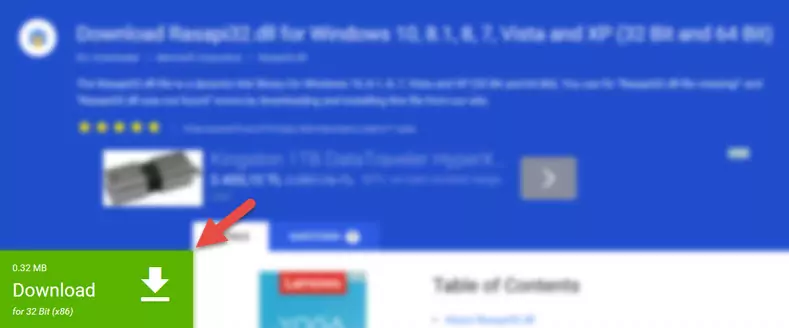
Step 1:Start downloading the Checking.dll library - "After clicking the Download" button, wait for the download process to begin in the "Downloading" page that opens up. Depending on your Internet speed, the download process will begin in approximately 4 -5 seconds.
Methods for Fixing Checking.dll
ATTENTION! Before beginning the installation of the Checking.dll library, you must download the library. If you don't know how to download the library or if you are having a problem while downloading, you can look at our download guide a few lines above.
Method 1: Fixing the DLL Error by Copying the Checking.dll Library to the Windows System Directory
- The file you will download is a compressed file with the ".zip" extension. You cannot directly install the ".zip" file. Because of this, first, double-click this file and open the file. You will see the library named "Checking.dll" in the window that opens. Drag this library to the desktop with the left mouse button. This is the library you need.
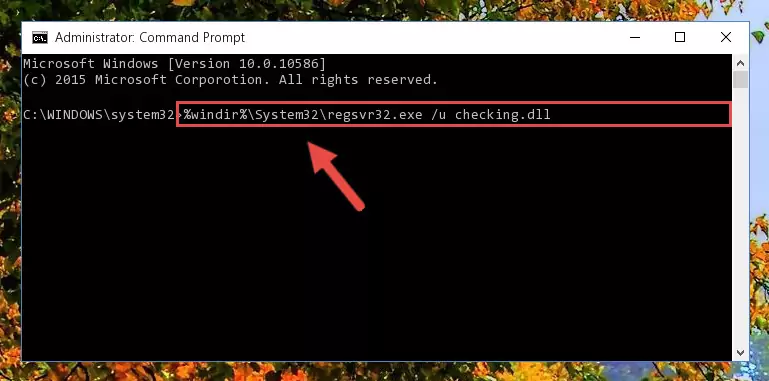
Step 1:Extracting the Checking.dll library from the .zip file - Copy the "Checking.dll" library and paste it into the "C:\Windows\System32" directory.
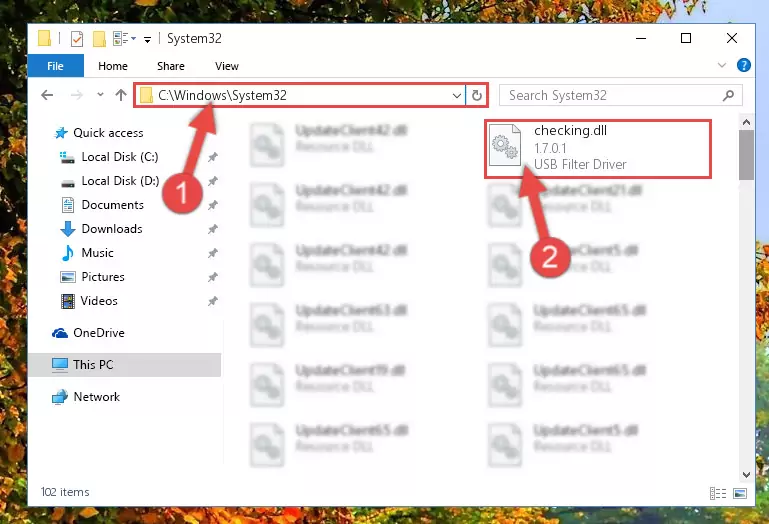
Step 2:Copying the Checking.dll library into the Windows/System32 directory - If your operating system has a 64 Bit architecture, copy the "Checking.dll" library and paste it also into the "C:\Windows\sysWOW64" directory.
NOTE! On 64 Bit systems, the dynamic link library must be in both the "sysWOW64" directory as well as the "System32" directory. In other words, you must copy the "Checking.dll" library into both directories.
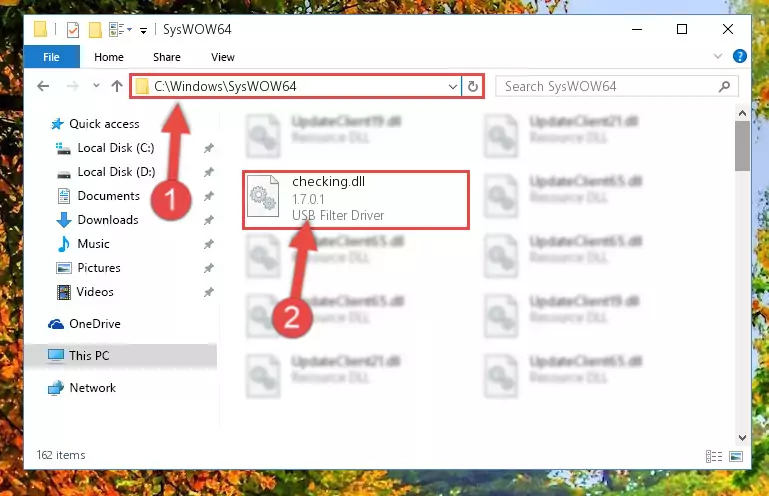
Step 3:Pasting the Checking.dll library into the Windows/sysWOW64 directory - In order to complete this step, you must run the Command Prompt as administrator. In order to do this, all you have to do is follow the steps below.
NOTE! We ran the Command Prompt using Windows 10. If you are using Windows 8.1, Windows 8, Windows 7, Windows Vista or Windows XP, you can use the same method to run the Command Prompt as administrator.
- Open the Start Menu and before clicking anywhere, type "cmd" on your keyboard. This process will enable you to run a search through the Start Menu. We also typed in "cmd" to bring up the Command Prompt.
- Right-click the "Command Prompt" search result that comes up and click the Run as administrator" option.
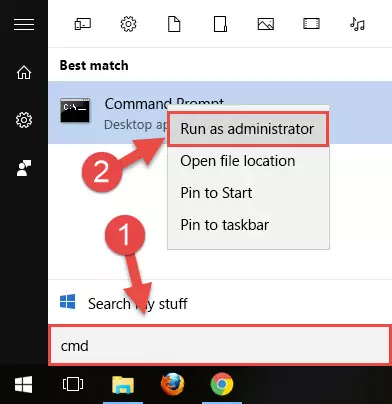
Step 4:Running the Command Prompt as administrator - Paste the command below into the Command Line window that opens up and press Enter key. This command will delete the problematic registry of the Checking.dll library (Nothing will happen to the library we pasted in the System32 directory, it just deletes the registry from the Windows Registry Editor. The library we pasted in the System32 directory will not be damaged).
%windir%\System32\regsvr32.exe /u Checking.dll
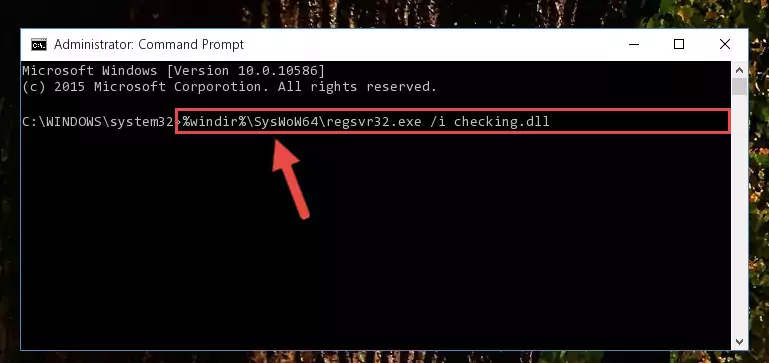
Step 5:Cleaning the problematic registry of the Checking.dll library from the Windows Registry Editor - If you have a 64 Bit operating system, after running the command above, you must run the command below. This command will clean the Checking.dll library's damaged registry in 64 Bit as well (The cleaning process will be in the registries in the Registry Editor< only. In other words, the dll file you paste into the SysWoW64 folder will stay as it).
%windir%\SysWoW64\regsvr32.exe /u Checking.dll
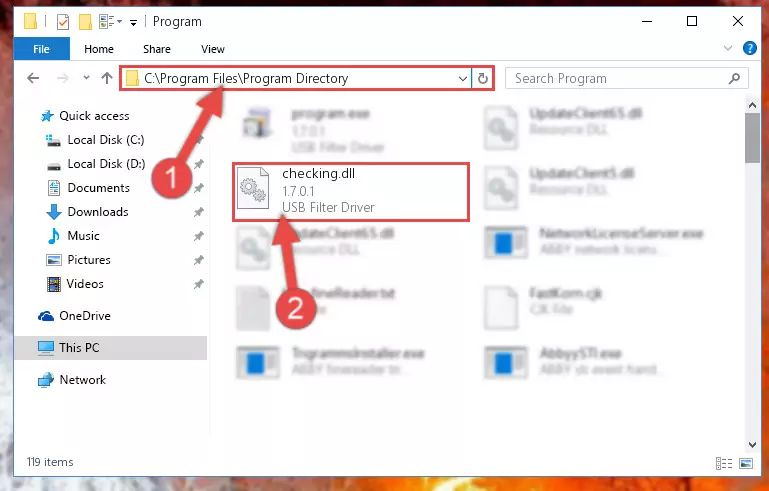
Step 6:Uninstalling the Checking.dll library's broken registry from the Registry Editor (for 64 Bit) - In order to cleanly recreate the dll library's registry that we deleted, copy the command below and paste it into the Command Line and hit Enter.
%windir%\System32\regsvr32.exe /i Checking.dll
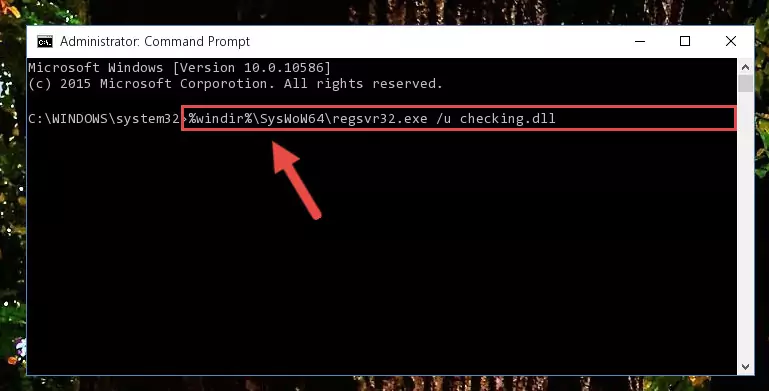
Step 7:Reregistering the Checking.dll library in the system - If you are using a Windows with 64 Bit architecture, after running the previous command, you need to run the command below. By running this command, we will have created a clean registry for the Checking.dll library (We deleted the damaged registry with the previous command).
%windir%\SysWoW64\regsvr32.exe /i Checking.dll
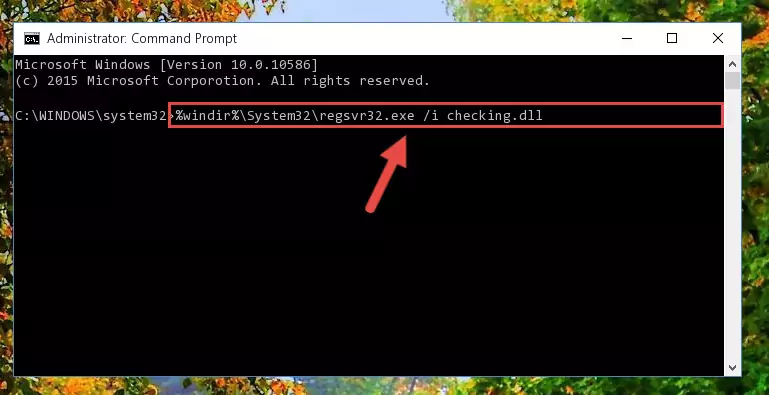
Step 8:Creating a clean registry for the Checking.dll library (for 64 Bit) - If you did all the processes correctly, the missing dll file will have been installed. You may have made some mistakes when running the Command Line processes. Generally, these errors will not prevent the Checking.dll library from being installed. In other words, the installation will be completed, but it may give an error due to some incompatibility issues. You can try running the program that was giving you this dll file error after restarting your computer. If you are still getting the dll file error when running the program, please try the 2nd method.
Method 2: Copying the Checking.dll Library to the Program Installation Directory
- First, you must find the installation directory of the program (the program giving the dll error) you are going to install the dynamic link library to. In order to find this directory, "Right-Click > Properties" on the program's shortcut.
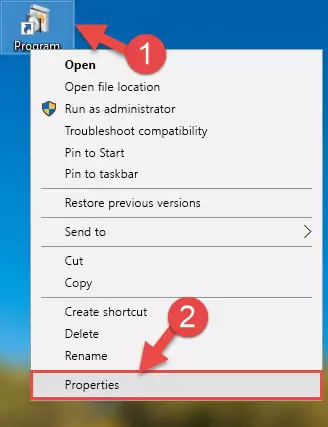
Step 1:Opening the program's shortcut properties window - Open the program installation directory by clicking the Open File Location button in the "Properties" window that comes up.
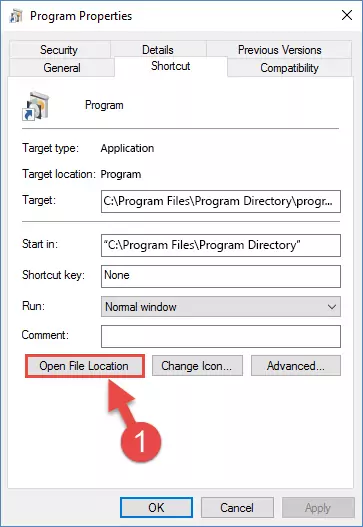
Step 2:Finding the program's installation directory - Copy the Checking.dll library into the directory we opened up.
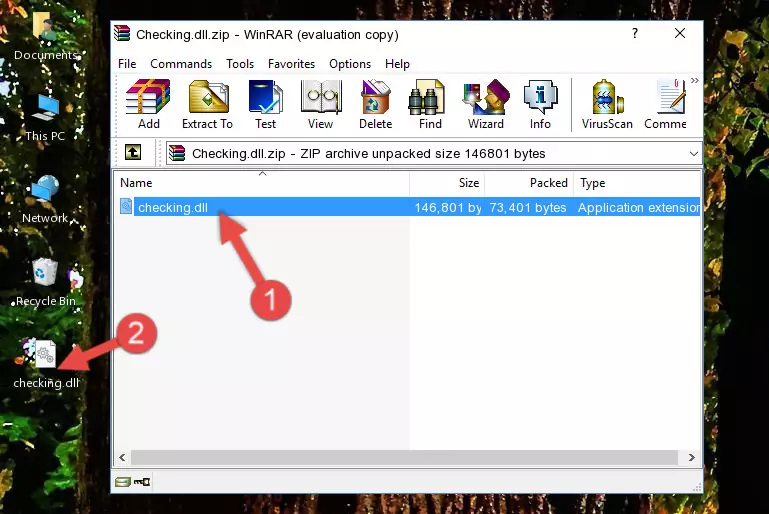
Step 3:Copying the Checking.dll library into the program's installation directory - That's all there is to the installation process. Run the program giving the dll error again. If the dll error is still continuing, completing the 3rd Method may help fix your issue.
Method 3: Doing a Clean Install of the program That Is Giving the Checking.dll Error
- Push the "Windows" + "R" keys at the same time to open the Run window. Type the command below into the Run window that opens up and hit Enter. This process will open the "Programs and Features" window.
appwiz.cpl
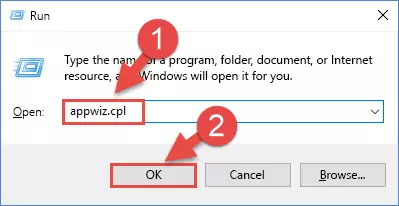
Step 1:Opening the Programs and Features window using the appwiz.cpl command - The Programs and Features screen will come up. You can see all the programs installed on your computer in the list on this screen. Find the program giving you the dll error in the list and right-click it. Click the "Uninstall" item in the right-click menu that appears and begin the uninstall process.
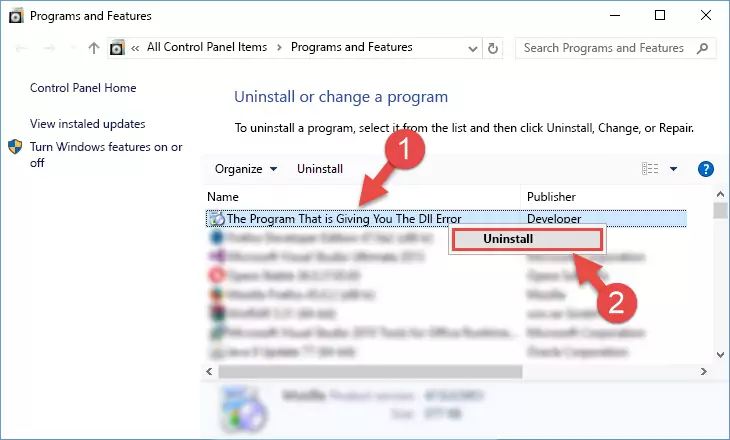
Step 2:Starting the uninstall process for the program that is giving the error - A window will open up asking whether to confirm or deny the uninstall process for the program. Confirm the process and wait for the uninstall process to finish. Restart your computer after the program has been uninstalled from your computer.
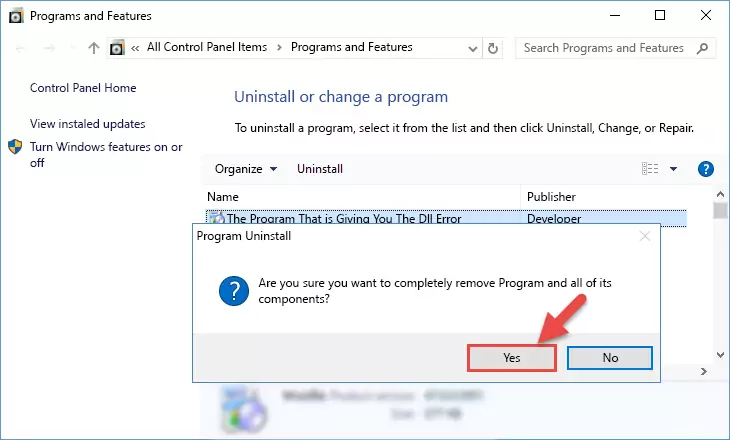
Step 3:Confirming the removal of the program - 4. After restarting your computer, reinstall the program that was giving you the error.
- You may be able to fix the dll error you are experiencing by using this method. If the error messages are continuing despite all these processes, we may have a issue deriving from Windows. To fix dll errors deriving from Windows, you need to complete the 4th Method and the 5th Method in the list.
Method 4: Fixing the Checking.dll Error Using the Windows System File Checker
- In order to complete this step, you must run the Command Prompt as administrator. In order to do this, all you have to do is follow the steps below.
NOTE! We ran the Command Prompt using Windows 10. If you are using Windows 8.1, Windows 8, Windows 7, Windows Vista or Windows XP, you can use the same method to run the Command Prompt as administrator.
- Open the Start Menu and before clicking anywhere, type "cmd" on your keyboard. This process will enable you to run a search through the Start Menu. We also typed in "cmd" to bring up the Command Prompt.
- Right-click the "Command Prompt" search result that comes up and click the Run as administrator" option.

Step 1:Running the Command Prompt as administrator - After typing the command below into the Command Line, push Enter.
sfc /scannow
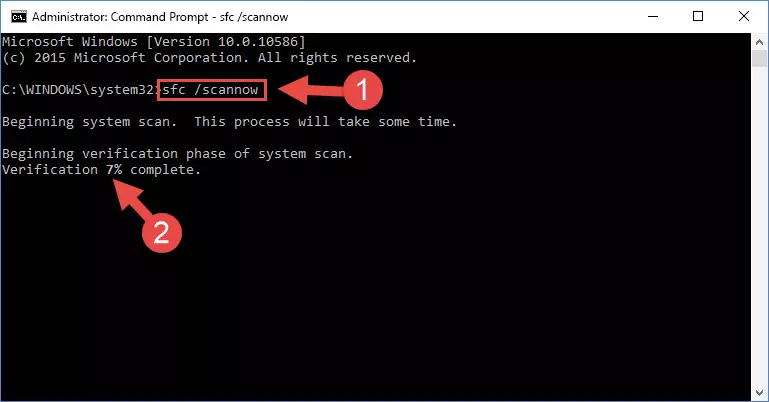
Step 2:Getting rid of dll errors using Windows's sfc /scannow command - Depending on your computer's performance and the amount of errors on your system, this process can take some time. You can see the progress on the Command Line. Wait for this process to end. After the scan and repair processes are finished, try running the program giving you errors again.
Method 5: Fixing the Checking.dll Error by Updating Windows
Most of the time, programs have been programmed to use the most recent dynamic link libraries. If your operating system is not updated, these files cannot be provided and dll errors appear. So, we will try to fix the dll errors by updating the operating system.
Since the methods to update Windows versions are different from each other, we found it appropriate to prepare a separate article for each Windows version. You can get our update article that relates to your operating system version by using the links below.
Explanations on Updating Windows Manually
Our Most Common Checking.dll Error Messages
When the Checking.dll library is damaged or missing, the programs that use this dynamic link library will give an error. Not only external programs, but also basic Windows programs and tools use dynamic link libraries. Because of this, when you try to use basic Windows programs and tools (For example, when you open Internet Explorer or Windows Media Player), you may come across errors. We have listed the most common Checking.dll errors below.
You will get rid of the errors listed below when you download the Checking.dll library from DLL Downloader.com and follow the steps we explained above.
- "Checking.dll not found." error
- "The file Checking.dll is missing." error
- "Checking.dll access violation." error
- "Cannot register Checking.dll." error
- "Cannot find Checking.dll." error
- "This application failed to start because Checking.dll was not found. Re-installing the application may fix this problem." error
